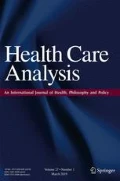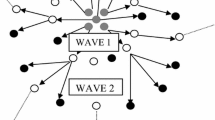Abstract
This paper suggests the adoption of a ‘capability approach’ to key concepts in healthcare. Recent developments in theoretical approaches to concepts such as ‘health’ and ‘disease’ are discussed, and a trend identified of thinking of health as a matter of having the capability to cope with life’s demands. This approach is contrasted with the WHO definition of health and Boorse’s biostatistical account. We outline the ‘capability approach’, which has become standard in development ethics and economics, and show how existing work in those areas can profitably be adapted to healthcare. Cases are used to illustrate the value of adopting a capability approach.
Similar content being viewed by others
Notes
For example, Nussbaum is critical of the indeterminacy of Sen’s version of the Capability Approach and argues that “Sen needs to be more radical...by introducing an objective normative account of human functionings and by describing a procedure of objective evaluation by which functionings can be assessed for their contribution to the good human life” [19, p. 176].
From here on, when we refer to ‘capability’, we mean ‘health considered as capability’ and not capability more broadly construed. How exactly these two concepts relate to each other is a major question that we hope to address in future work.
This potential is at the heart of the promise we see in taking a capability approach to health. However, detailed exploration of this claim is beyond the scope of this paper, and will be addressed in future research.
References
Alkire, S. (2002). Valuing freedoms: Sen’s capability approach and poverty reduction. Oxford: OUP.
Anstey, K. W. (2002). Are attempts to have impaired children justifiable? Journal of Medical Ethics, 28, 286–288.
Bircher, J. (2005). Towards a dynamic definition of health and disease. Medicine, Health Care and Philosophy, 8, 335–341.
Boorse, C. (1975). On the distinction between disease and illness. Philosophy and Public Affairs, 5.1, 49–68.
Boorse, C. (1976). What a theory of mental health should be. Journal for the Theory of Social Behaviour vol. 6.
Boorse, C. (1977). Health as a theoretical concept. Philosophy of Science, 44, 542–573.
Boorse, C. (1997). A rebuttal on health. In J. M. Humber & R. F. Almeder (Eds.), What is disease? (pp. 3–134). Totowa, NJ: Humana Press.
Brock, D. (1993). Quality of life measures in health care and medical ethics. In M. C. Nussbaum & A. Sen (Eds.), The quality of life (pp. 95–132). Oxford: Clarendon Press.
Crocker, D. A. (1992). Functioning and capability: the foundations of Sen’s and Nussbaum’s development ethic. Political Theory, 20(4), 584–612.
Gammelgaard, A. (2000). Evolutionary biology and the concept of disease. Medicine, Healthcare and Philosophy, 3, 109–116.
Hofmann, B. (2002). On the triad disease, illness and sickness. Journal of Medicine and Philosophy, 27.6, 651–674.
Kovacs, J. (1998). The concept of health and disease. Medicine, Healthcare and Philosophy, 1, 31–39.
Levy, N. (2002). Deafness, culture and choice. Journal of Medical Ethics, 28, 284–285.
Lewens, T., & McMillan, J. (2004). Defining disease. The Lancet, 363, 664.
Nordenfelt, L. (1995). On the nature of health. An action theoretic approach. Dordrecht: Kluwer Academic Publishing.
Nordenfelt, L. (2001). Health, science, and ordinary language. Amsterdam/New York: Rodopi.
Nordenfelt, L. (2007a). The concepts of health and illness revisited. Medicine, Healthcare and Philosophy, 10, 5–10.
Nordenfelt, L. (2007b). Establishing a middle-range position in the theory of health: a reply to my critics. Medicine, Healthcare and Philosophy, 10, 29–32.
Nussbaum, M. C. (1988). Nature, function, and capability: Aristotle on political distribution. Oxford studies in ancient philosophy, supp vol.
Ruger, J. P. (2004). Ethics of the social determinants of health. The Lancet, 364, 1092–1097 Sept 18.
Schramme, T. (2007). A qualified defence of a naturalist theory of health. Medicine, Healthcare and Philosophy, 10, 11–17.
Sen, A. (1979). Equality of what? The tanner lecture on human values. Delivered May 22 at Stanford University.
Sen, A. (1992). Inequality re-examined. Cambridge, MA: Harvard UP.
Sen, A. (1993). Capability and well-being. In M. C. Nussbaum & A. Sen (Eds.), The quality of life (pp. 30–54). Oxford: Clarendon Press.
Sen, A. (1999). Development as freedom. New York: Knopf Press.
Spriggs, M. (2002). Lesbian couple create a child who is deaf like them. Journal of Medical Ethics, 28, 283.
Verkerk, M. A., Busschback, J. J. V., Karssing, E. D. (2001). Health-related quality of life research and the capability approach of Amartya Sen. Quality of Life Research, 10, 49–55.
WHO (1948). Preamble of the Constitution of the World Health Organisation as adopted by the International Health Conference (Official Records of the WHO, No. 2, p. 100).
Author information
Authors and Affiliations
Corresponding author
Rights and permissions
About this article
Cite this article
Law, I., Widdows, H. Conceptualising Health: Insights from the Capability Approach. Health Care Anal 16, 303–314 (2008). https://doi.org/10.1007/s10728-007-0070-8
Received:
Accepted:
Published:
Issue Date:
DOI: https://doi.org/10.1007/s10728-007-0070-8



